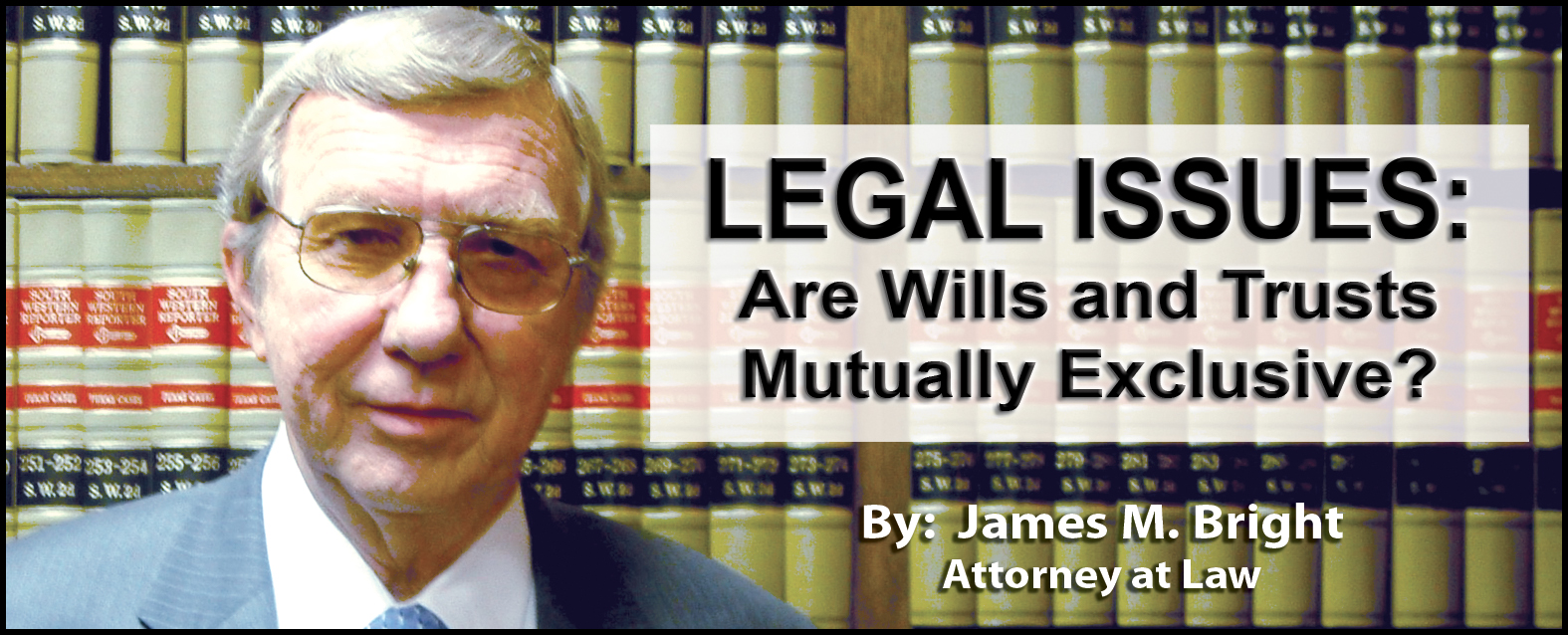The following is provided for informational purposes only and is not, nor should it be construed as legal advice.
The answer to the question of whether or not Wills and Trusts are mutually exclusive is NO. Wills and Trusts are not mutually exclusive. When discussing plans for the disposition of their property after death, many persons with whom I speak believe that a choice needs to be made between the two. Such is not the case. In some cases, a portion of the property passes under the Will and another portion passes through a trust. This is a common solution if real property is owned in more than one state, or the testator wants it to be used in a particular way. This comes up many times when possible beneficiaries are minors, spendthrifts, disabled, etc.
Most Wills that this firm writes include a testamentary trust as part of the Will. A testamentary trust is a trust that does not come into being until after death.
A common example of a testamentary trust contained in a Will can be described as a “testamentary springing trust” used to provide for the care of children or grandchildren. This trust can be as specific or as general as you wish it to be and should be tailored for the needs of your particular family. Your attorney can be of great assistance in “fleshing out” your wishes.
Not often, but occasionally, clients wish to have everything in their estate pass through a “revocable living trust” which they maintain during their lifetime. This type of trust holds the deed to your home, title to your automobile, your checking and savings account, or any other asset that you may own. This can be a very tedious and time-consuming exercise while you are still living. If you elect to hold your assets in a revocable living trust, then you will also need a “pour-over” Will. The purpose of the “pour-over” Will is to capture assets that were not captured by the trust and through probate pour them back into the trust. In all but the most rare cases, your family will need to probate your Will in addition to administering the trust.
Testamentary trusts are a valuable tool for effective estate planning, but they are not the only tool. In one particular matter handled by this firm, our clients had most of their assets in Texas, but owned inherited out-of-state real property that they wanted to keep in the family and have their children and grandchildren use for recreational purposes. The solution that we proposed and they accepted is to place title to the out-of-state land in an inter vivos trust (i.e., living trust) while owners are still alive and those other assets, including their home, auto and accounts, pass under their Will and be distributed in accordance with the wishes expressed therein. This solution avoided the necessity of probating in both states and at the same time simplified distribution in Texas.
Testamentary trusts, inter vivos trusts and simple or complex. Wills can all exist at the same time, depending on the particular desires and needs of the testator.
A few persons elect to pass ownership of their estates through a trust instead of a Will. There is nothing wrong with that approach and nothing wrong with the Will-only approach so long as the chosen approach used yields the result that you desire.
Some persons like to pass their property through trusts instead of a Will, because the Will, when filed for probate, becomes a part of the public record and can be accessed by the community at large. As frightening as that sounds, there is no reason for concern. The Texas Legislature recognized this problem in about 2011 and passed provisions that allowed more privacy. Those provisions in the Texas Estates Code permit filing of an “Affidavit in lieu of Inventory” where there are no unsecured debts, unpaid taxes or unpaid administrative expense, thereby protecting the estate from prying eyes.
No matter what your wishes might be for distribution of your estate after your death, you will best be served by soliciting the help of an attorney of your choice who has demonstrated expertise in estates law. As citizens of Harris and Montgomery Counties in Texas, we have a multitude of capable planners.
James Bright has been admitted to practice before the Federal Courts for the Southern District of Texas and Eastern District of Texas as well as all of the Justice Courts, Probate Courts, County Courts at Law, District Courts, Courts of Appeal and Supreme Court for the State of Texas. He maintains an office in Houston and by appointment another at 208 McCown Street in the heart of historic Montgomery. Contact may be made by telephone (936) 449-4455 or (281) 586-8277. For more information about wills or probate in Texas, please see- www.houstontxprobate.com
IF YOU WISH TO SUGGEST A TOPIC FOR THIS COLUMN, SEND TO:
JAMES M. BRIGHT
14340 TORREY CHASE BLVD., SUITE 150
HOUSTON, TEXAS 77014
Email: [email protected]





